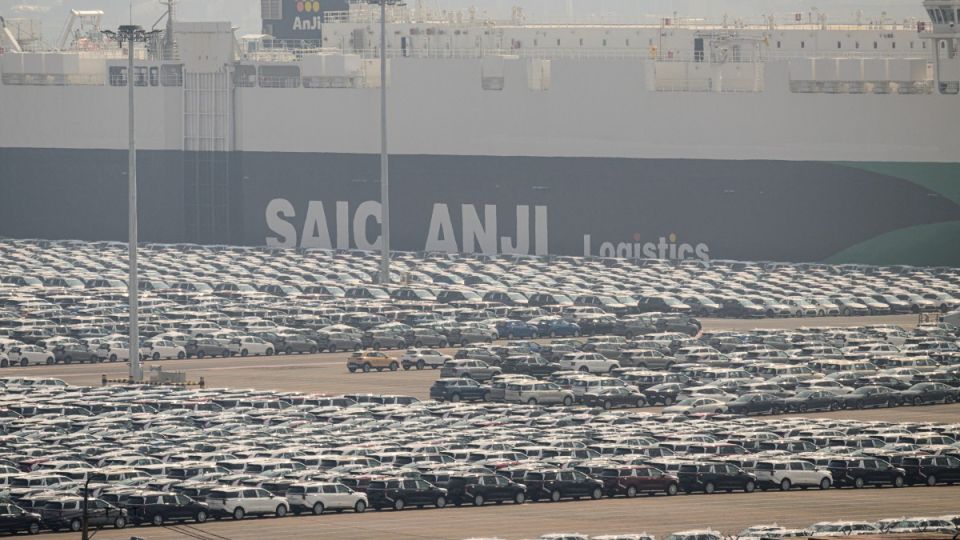July 1, 2025
SEOUL – South Korea’s export growth is projected to slow in the third quarter, weighed down by major headwinds including Trump-led tariff policies and a sluggish global economy, according to a local trade agency on Monday.
With US President Donald Trump showing no signs of rolling back hefty tariffs during a Sunday interview, industry sentiment is expected to dampen further, observers say.
The Korea International Trade Association said its export business survey index of 1,066 exporting companies stood at 96.3 for the July-September period, up from 84.1 in the previous quarter but still below the benchmark 100 level for the third consecutive quarter.
A reading below 100 means more companies project conditions to worsen, while a reading above 100 indicates the opposite.
KITA said export-oriented companies were feeling the pinch due to ongoing trade tensions from US tariff measures amid weakening global growth and heightened foreign exchange volatility.
“Since the launch of Trump’s second administration, global uncertainties have expanded, coupled with a slowdown in major economies, causing the business sentiment among Korean exporters to freeze up,” said Yang Ji-won, senior researcher at KITA.
“Uncertainties are increasing not only for items directly affected by tariffs, such as home appliances and automobiles, but also for strategic items like semiconductors, making this a critical time for proactive measures and market diversification efforts.”
Among the 15 major sectors surveyed, home appliances showed the worst outlook with an EBSI of 52.7, marking its third consecutive quarter in the 50s.
The grim figure follows the Trump administration’s decision to expand steel tariffs of 50 percent to include steel-derived goods, including washing machines, refrigerators and other appliances containing steel on June 23.
Auto and auto parts companies are also bracing for fallout, with their EBSI falling to 56.0. The auto industry was hit particularly hard by Trump’s April decision to impose 25 percent tariffs on all imported car parts.
In contrast, the semiconductor sector showed confidence with an EBSI of 147.1, driven by rising DRAM prices and growing demand for AI chips. The shipbuilding industry also performed strongly at 135.5, buoyed primarily by robust demand for LNG carriers.
The report comes as Seoul has been pushing for reduced tariff rates or exemptions as the Trump administration’s 90-day pause on country-specific tariffs expires on July 9. Unless a new trade deal is reached, tariffs on Korean goods will jump from the current 10 percent to 25 percent after the deadline.
On Sunday, South Korea’s new trade envoy Yeo Han-koo returned from tariff negotiations in Washington, the first high-ranking official to visit the US capital since the Lee Jae Myung administration took office on June 4.
“A channel has been established for the new (Korean) government to negotiate with the US side,” Yeo told reporters at Incheon Airport on Sunday. “I believe that a certain level of trust has been formed to accelerate future negotiations.”
During his visit, Yeo met with US Trade Representative Jamieson Greer and Secretary of Commerce Howard Lutnick, as well as with US lawmakers and opinion leaders to garner support for Korea’s position.
Yeo acknowledged that Seoul’s trade negotiations with Washington have been relatively slow compared to other countries.
“We are not in a position to feel assured. Negotiations are fluid, and we will do our best to achieve the strongest outcome possible in the time we have,” he said.
Yeo also said the US has expressed interest in Korea’s participation in the Alaska LNG project.
As for the possibility of the US allowing extensions to the upcoming July 8 reprieve, Yeo said, as the US is in talks with over 20 countries, “the US situation remains very fluid and all possibilities are open as of now.”
But on Sunday, Trump made clear in an interview that he has no plans to offer an extension on the tariff pause.
Trump said on Fox News Channel’s “Sunday Morning Futures” that his administration is ready to unilaterally send letters stating the tariff rates.
“But we’re going to be sending letters out starting pretty soon,” said Trump. “We’re going to say, ‘Congratulations, we are allowing you to shop in the United States of America. You’re going to pay a 25 percent tariff, or a 35 percent or a 50 percent or a 10 percent.’”


